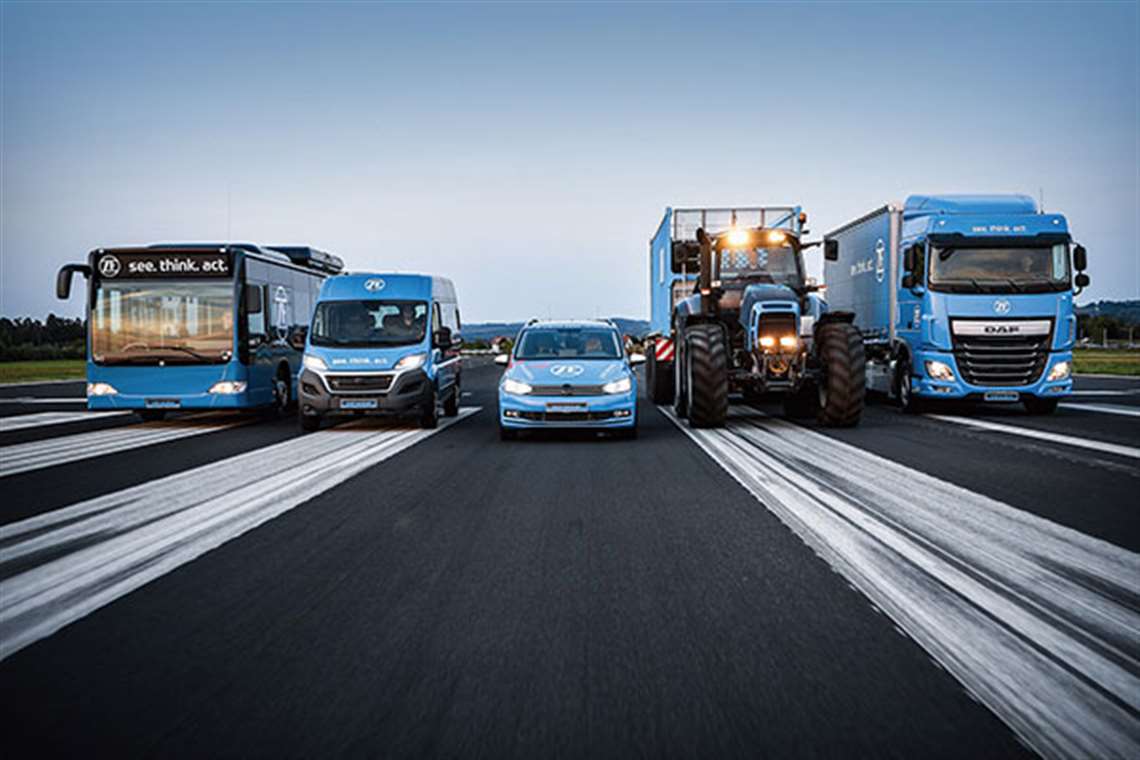A Project House For Electromobility
17 July 2019

Trend for electrification needs concerted efforts from whole supplier chain. ZF promotes internal synergies and cooperation with partners.
ZF Friedrichshafen inaugurated the E-Mobility Project House dedicated to commercial vehicles and off-highway applications. Markus Eisele, head of Development in the E-Mobility Project House, described the project as a leaner structure where customers in the heavy-duty machinery market can find specific answers to their needs in the field of electrification.
ZF reported that in 2018 about 8 million heavy-duty vehicles have been produced worldwide – including trucks, construction vehicles, agricultural machinery, and material handling applications – with a very high diversification in vehicle types and operational requirements often resulting in relatively small production numbers.
For these customers, the trend towards some degree of electrification for their vehicles becomes rather a burden, and the same applies to their supplier chain which has to invest heavily to offer commercially-viable solutions within tight deadlines.
Thus the idea of the E-Mobility Project House, that brings together expertise and economy of scale with the aim of offering modular systems with the best suitable components for the series production of heavy-duty electrified vehicles. “We are convinced that complex systems need close collaboration of resources and this is why we bring together engineers from our German locations in Passau (for the off-highway applications) and Friedrichshafen (for commercial vehicles) in a dedicated physical space that we called E-Mobility Project House,” said Eisele. “We also have a matrix organization and cross-divisional teams.”
E-mobility in the heavy-duty market will experience different introduction scenarios, based on a number of different factors. Eisele reported that ZF expects urban areas to be the first to see series-produced electrified machines in use, among which city buses, delivery trucks, and construction vehicles.
“Considering different introduction scenarios, we believe that some pre-conditions and expectations will have priority for suppliers and for their OEM customers,” Eisele explained. “First of all, the introduction of e-mobility solutions will start at low and unpredictable volumes. At the same time, new powertrain technologies will have to insure the same or better performance levels than conventional solutions.
“Suppliers will have to guarantee high durability right from the first product’s generation and be able to progress very fast from first concepts to a standard operating procedure, passing through the prototyping phase with controlled costs. Suppliers also need to provide system integration support, meaning more synergies across the whole chain. Finally, serial-produced components will need to afford an attractive cost.”
Gerhard Stempfer, ZF’s head of Business Development in the Project House, recently presented a paper on the E-Mobility Project House at AVL’s International Commercial Powertrain Conference in Graz, Austria. He emphasized how the electrification trend in the heavy-duty commercial vehicle and off-highway market will require a number of additional key competences that ZF is addressing in its strategy: “System integration for hybrid-electric and pure electric vehicles is a must, as well as the symbiosis between the electric motor and the transmission and axles.
“The in-house development of electric motors and inverters is also a key step, as well as the management of these systems and the setup of modular software for electrified machinery.”
All the above targets are being addressed in the E-Mobility Project House with the aim of releasing application-specific system solutions. The path will be paved by high-speed partnership-based pilot projects with customers and the integration of internal and external industrialization facilities to build the necessary global production capabilities.
At this point, ZF is capable of supplying electric drives for all vehicle types, from bicycles to 40-ton trucks. Components such as the TraXon Hybrid automated transmission system for commercial vehicles are already available and have demonstrated their efficiency. According to ZF, the TraXon Hybrid makes 40-ton trucks and coaches up to 7% more economical to operate. An electric motor with an integrated transmission ratio is positioned between the combustion engine and transmission and supports a maximum 130 kW power output and 1200 Nm torque.
The AxTrax AVE electric portal axle is in volume production for low-floor city buses and works with the concept of an integrated close-to-the-wheel drive. Two liquid-cooled asynchronous motors deliver 125 kW and 11 000 Nm each. The AxTrax AVE is offered in a networked system featuring fully integrated inverters and drive control.
The CeTrax electric central drive for low-floor and high-floor buses delivers up to 300 kW and 4400 Nm and is designed for challenging urban applications. It can be integrated into existing vehicle platforms without having major modifications.
In off-highway applications, ZF has introduced the electric eTRAC wheel head, that consists of a liquid-cooled three-stage asynchronous motor, a downstream two-stage transmission and integrated brakes. This modular system can be used with a variety of vehicles, including agricultural machinery, construction vehicles and forklift trucks.
STAY CONNECTED




Receive the information you need when you need it through our world-leading magazines, newsletters and daily briefings.
POWER SOURCING GUIDE
The trusted reference and buyer’s guide for 83 years
The original “desktop search engine,” guiding nearly 10,000 users in more than 90 countries it is the primary reference for specifications and details on all the components that go into engine systems.
Visit Now
CONNECT WITH THE TEAM









